#Taneyev
Text
youtube
Sergei Taneyev (1856-1915) - Prelude and Fugue in G-sharp Minor, Op. 29
2 notes
·
View notes
Text
Tchaikovsky be like: Sergey, I love you but the Government doesn't allow it 😔
1 note
·
View note
Text
I want to start a little thing, so reblog with a piece you discovered recently :)
I'll start:
youtube
Taneyev's 1st symphony in E minor!
@klavierpanda @chopinpavlova
#classical music#lasar being incoherent#i get fixated on specific composers a lot of the time so i thought I'd do this to get more of a variety!!#feel free to reblog this if you weren’t tagged! i just don't have many mutuals i know are interested
6 notes
·
View notes
Text


OTD in Music History: Composer, conductor, and pianist Sergei Prokofiev (1891 - 1953) is born in what is now Ukraine.
Prokofiev's amazingly charmed early life in Imperial Russia was almost a mirror image of his final miserable years, which were spent suffering under Stalin's repressive Soviet regime.
Recognized as a child prodigy from a very early age, Sergei Taneyev (1856 - 1915) arranged for the young Prokofiev to spend the Summer of 1902 studying privately with Reinhold Gliere (1875 - 1956). Further lessons with Gliere followed the next year, and then in 1904 Prokofiev traveled with his mother to St. Petersburg to meet Alexander Glazunov (1865 - 1936), who was a professor at the St. Petersburg Conservatory.
Glazunov urged Prokofiev's mother enroll Prokofiev at the Conservatory right away, even though he was still several years younger than most of his classmates. She accepted this invitation, and while there, Prokofiev studied under Anatoly Lyadov (1855 - 1914) for harmony and counterpoint, Nikolai Tcherepnin (1873 - 1945) for conducting, and Nikolai Rimsky-Korsakov (1844 - 1908) for orchestration.
Prokofiev ultimately finished his years of schooling by entering the so-called "battle of the pianos": a highly cutthroat competition open to the five best piano students at the Conservatory, for which the grand prize was a beautiful grand piano. Prokofiev won -- by performing *his own* recently composed 1st Piano Concerto.
Soon thereafter, Prokofiev journeyed on to London, where his nascent professional career was jumpstarted by legendary impresario Sergei Diaghilev (1872 - 1929) and his famous "Ballets Russes"…
PICTURED: A photograph showing the young Prokofiev at the piano, which he signed and inscribed to a fan in Cyrillic (translated: “To A.A. Likhachev from SPKRF”) in 1927 during his historic return to Russia on his first concert tour of the Soviet Union.
#Sergei Prokofiev#Prokofiev#Сергей Прокофьев#Прокофьев#classical music#music history#composer#classical composer#pianist#piano#conductor#music#classical musician#musician#Opera#Igrok#War and Peace#opera#bel canto#aria#Ballet#Hamlet#Romeo and Juliet#Cinderella
15 notes
·
View notes
Video
youtube
Nikolai Myaskovsky : String Quartet No. 3 in D minor Op. 33 No. 3
Performed by the Taneyev Quartet.
I’ve been on a huge Myaskovsky kick lately, and this is a big fav of mine.
0 notes
Text
El día que Sofía Tolstaia se hartó de su marido, Lev Tolstói, y lo escribió
Sofía Tolstaia y su marido, Lev Tolstoi. (Dominio Público)
Se publica en español ‘Romanza sin palabras’, la novela en la que la escritora contó su relación platónica con el músico Taneyev que desató los celos del autor de ‘Guerra y paz’
Origen: El día que Sofía Tolstaia se hartó de su marido, Lev Tolstói, y lo escribió

View On WordPress
1 note
·
View note
Photo
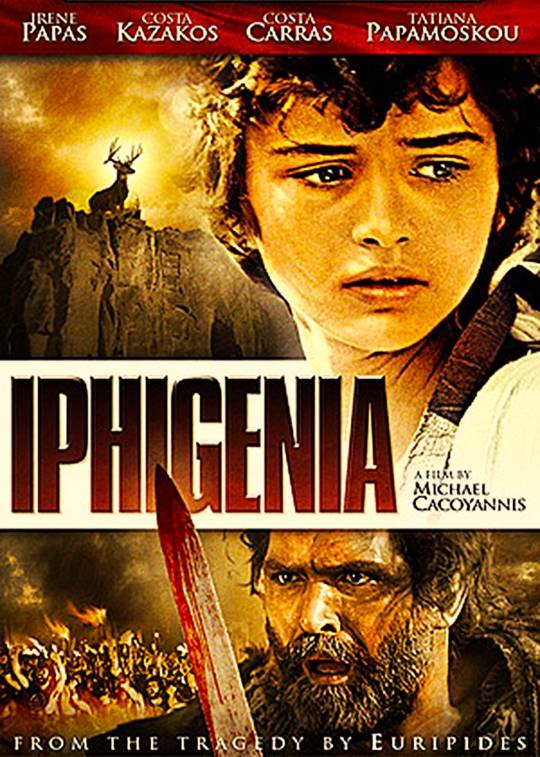
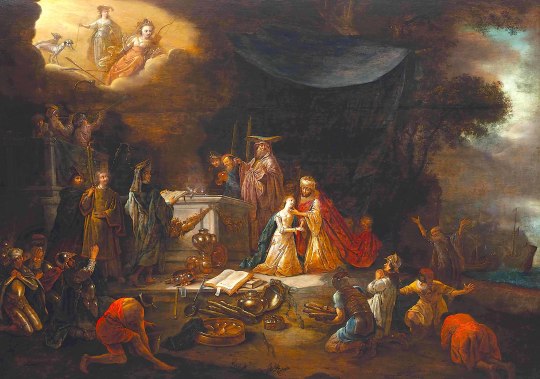
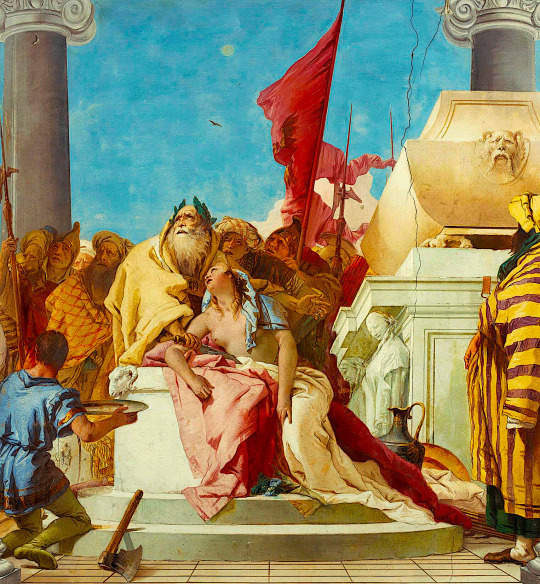
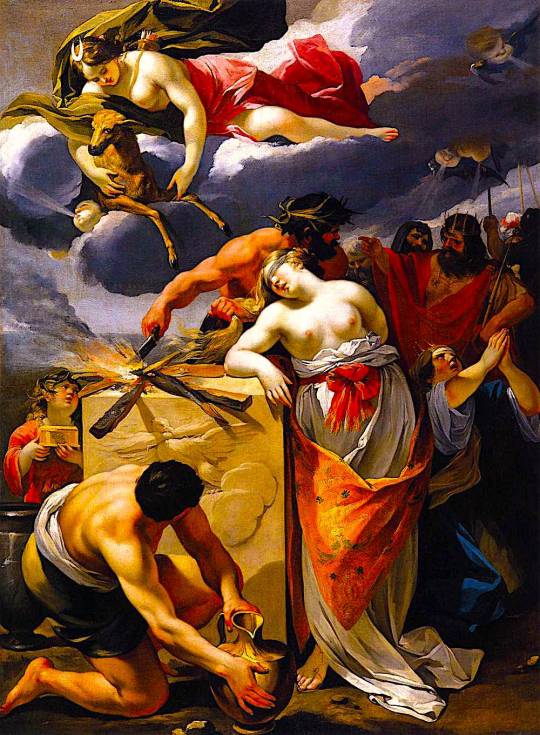
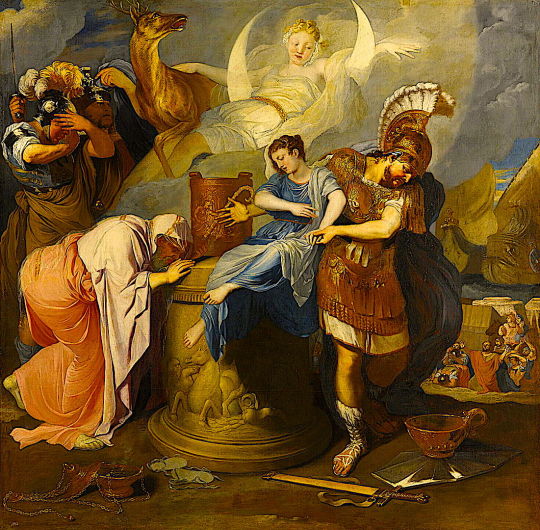
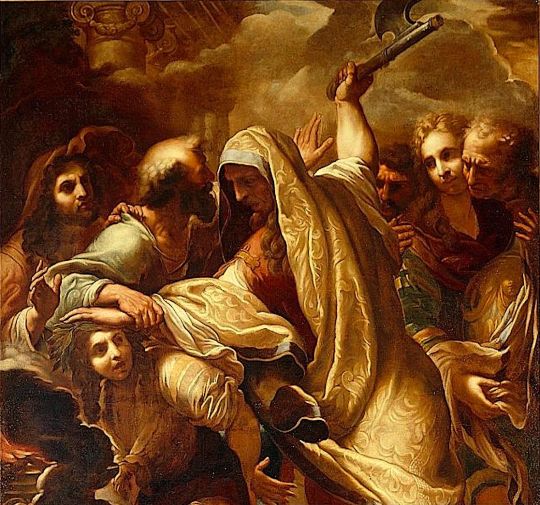


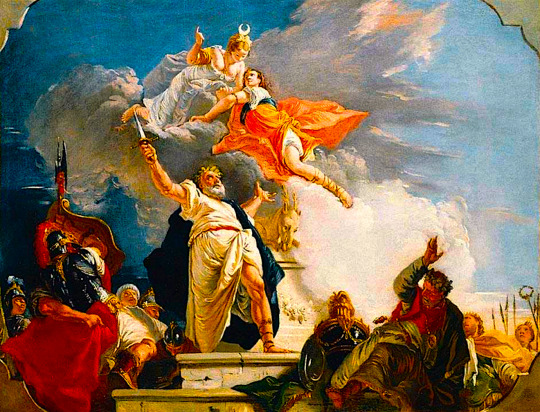
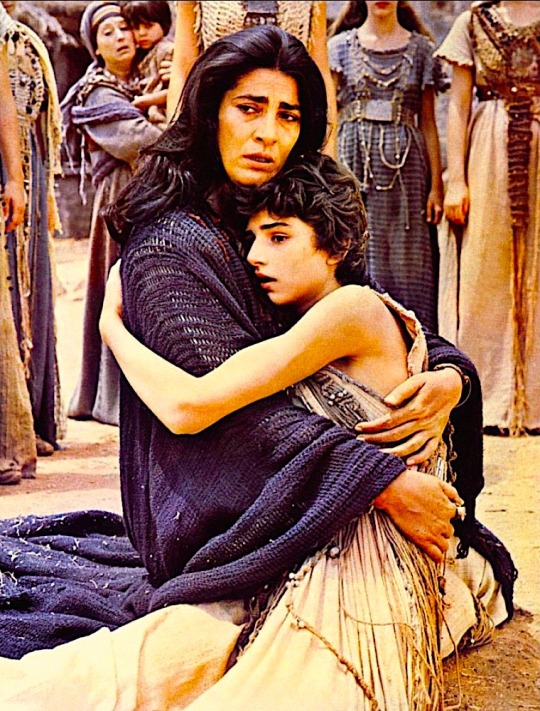
youtube
youtube
youtube
youtube
youtube
GALLERY:
1 Michael Cacoyannis' 1977 film
Painters:
2 Jacob De Wet
3 Giovanni Battista Tiepolo
4 François Perrier
5 Bertholet Flemalle
6 Nicolo Tornioli
7 Giovanni Andrea Carlone
8 Franz Anton Maulbertsch
9 Francesco Fontebasso
Actors:
10 Irene Papas & Tatiana Papamoskou
IPHIGENIA'S ANCIENT CAUTIONARY MYTH STILL RESONATES
– by David D. Fowler & Aeon 999
MFF marks INTERNATIONAL WOMEN'S DAY, and WOMEN'S HISTORY MONTH, by exploring an iconic work of art from many centuries ago. EURIPIDES' tragedy, IPHIGENIA IN AULIS, is one of the greatest anti-war statements ever created; and it is also a powerful commentary on the plight of women down through the ages.
EURIPIDES' powerful drama focuses on the dilemma facing KING AGAMEMNON, when the gods order him to sacrifice his own daughter. It can also be seen as a protofeminist work – highlighting perils faced by women and girls, when they are part of a militaristic, male-oriented culture with authoritarian religious leaders. Various traditions of this myth are embodied by the paintings in our image gallery.
This story is at the heart of our special feature: IPHIGENIA, the 1977 epic masterpiece, by ZORBA THE GREEK director MICHAEL CACOYANNIS. It is one of the finest depictions of a Greek tragedy, which takes a few imaginative artistic liberties with the conventions of that art form. Chief among its virtues are the powerhouse performances of IRENE PAPAS, as Queen Clytemnestra; and TATIANA PAPAMOSKOU as her daughter Iphigenia.
The videos embedded above include an extended trailer from this film – along with a graphic novel portrayal of the death of Iphigenia; and an experimental theatre adaptation of Agamemnon's ritual murder of his daughter. As an alternative metaphor, we have also included accounts of the biblical legend of Abraham being called to sacrifice his son Isaac. One is a poignant song by LEONARD COHEN; and the other a powerful depiction of WWI poet WILFRED OWEN's apocalyptic take on the same story.
An old Chinese proverb calls women "THE OTHER HALF OF THE SKY". In keeping with our desire to honor the respect being shown to women worldwide on this particular day, one of our playlists offers eloquent articles debunking stereotypes about FEMINISM. We also include items dealing with the history and meaning of these holidays, embodying more progressive attitudes toward women.
We present various retellings of Iphigenia's story, and related myths, in movies, plays, audiobooks, and operas. This includes works by composers such as CHRISTOPH WILLIBALD GLUCK, BENJAMIN BRITTEN, WAYNE SHORTER, SERGEY TANEYEV, NICOLE V. GAGNÉ, and DAVID AVIDOR. We also offer different versions of Euripides' companion piece, IPHIGENIA IN TAURIS – which tells an alternative tale, wherein the heroine is supernaturally rescued from her father's sacrifice by the goddess Artemis.
We feature works created by acclaimed directors such as PETER HALL and ANDREI KONCHALOVSKY, as well as another outstanding Cacoyannis film, THE TROJAN WOMEN. Performers include MARIA CALLAS, KATHARINE HEPBURN, VANESSA REDGRAVE, GENEVIEVE BUJOLD, ISABELLA ROSSELLINI, ARMAND ASSANTE, GRETA SCACCHI, BERNADETTE PETERS, ERIC ROBERTS, GERALDINE CHAPLIN, CHRISTOPHER LEE and ESPERANZA SPALDING.
It should be noted that some of these videos are by talented amateurs; thus, there are occasional technical issues, and a few have overly lengthy introductions. Nevertheless, they are well worth watching, if you overlook these very minor flaws. Most of the foreign language productions have English subtitles, sometimes accessed via the CC feature on YouTube videos.
We end with a section of works dealing with the fates of characters from Euripides' plays – and depictions of the Trojan War and its aftermath, by notables such as AESCHYLUS and HOMER. But first, we present further interpretations of the story of Isaac from the Book Of Genesis, one of human history's most enduring tales of child sacrifice. This is followed by the extraordinary Cacoyannis film; its availability, in a good quality copy, is what inspired us to do this post for Women's Month.
SACRIFICIAL MYTHS
Story Of Isaac
https://www.youtube.com/watch?v=eJ30w3eQR4o
Abraham & The Sacrifice Of Isaac
https://www.youtube.com/watch?v=3zb9ql-rSOs
Abraham & Isaac Paintings
https://fineartamerica.com/art/paintings/sacrifice+of+isaac
The Old Man & The Young
https://www.youtube.com/watch?v=16kjENwNjDw
Britten War Requiem: Offertorium
https://www.youtube.com/watch?v=xctltGbPL4s
Iphigenia In Greek Mythology
https://owlcation.com/humanities/The-Story-of-Iphigenia-in-Greek-Mythology
The Sacrifice Of Iphigenia
https://www.youtube.com/watch?v=ay5kRC_989U
Iphigenia In Aulis & Tauris
https://www.youtube.com/watch?v=CcBIn_PvaWs
Cacoyannis' Iphigenia (1977)
https://www.youtube.com/watch?v=5jD-IuhwLmk
MYTHS VS REALITIES
Mythology & Feminist Thought
https://consortium.gws.wisc.edu/conference/past-conferences/announcing-the-4w-and-wgsc-2021-conference/2021-presentations/mythology-and-feminism-the-connection-between-myth-and-feminist-thought/
Myths & Truths About Feminism
https://www.theodysseyonline.com/10-myths-and-truths-about-feminism
https://femalemindunleashed.com/myths-about-feminism/
https://www.mic.com/articles/96292/the-10-worst-myths-about-feminism-debunked
https://www.bl.uk/sisterhood/articles/myths-and-controversies-surrounding-feminism
https://medium.com/@makemuse/5-of-the-most-common-misconceptions-about-feminism-91292daa5c37
https://studybreaks.com/culture/feminism-common-stereotypes/
https://icytales.com/top-10-myths-about-feminism/
https://www.aware.org.sg/2010/02/myths/
https://www.forbes.com/sites/christinapark/2015/03/07/a-millennials-perspective-five-myths-about-modern-feminism/
https://medium.com/keepmesafe/widespread-myths-about-feminism-and-feminists-fe47456a7897
International Women's Day
https://www.internationalwomensday.com/
https://www.msn.com/en-ph/news/other/international-women-s-day-women-s-history-month-101-what-you-need-to-know-about-the-celebration/ar-AA185qpU
https://www.msn.com/en-us/news/other/how-women-s-rights-in-the-us-have-been-eroded-since-the-last-women-s-history-month/ar-AA18bHUg
https://www.wmagazine.com/culture/womens-history-month-2023-books-feminist-reading-list
https://www.forbes.com/sites/forbes-personal-shopper/2023/03/01/international-womens-day-gifts/?sh=5bc62e497ba6
National Women's History Month
https://www.mentalfloss.com/article/655595/womens-history-month-facts
https://www.nbcwashington.com/news/national-international/when-is-womens-history-month-everything-you-need-to-know/3289829/
https://www.history.com/topics/holidays/womens-history-month
https://nationaltoday.com/national-womens-history-month/
https://news.yahoo.com/celebrate-women-history-month-female-220052929.html
IPHIGENIA AT AULIS
Iphigenia At Aulis Onstage
https://www.youtube.com/watch?v=8yR6VwSG_wY
https://www.youtube.com/watch?v=JTGn__ph4bY
https://www.youtube.com/watch?v=ILyUShi5l4g
Gluck: Iphigénie En Aulide
https://www.youtube.com/watch?v=fBRU5NlQVxw
https://www.youtube.com/watch?v=PJL2E7Aqu40
Iphigenia: A New Opera
https://www.youtube.com/watch?v=wbeGIdyhy7c
https://www.youtube.com/watch?v=X5erDLURRCE
https://www.youtube.com/watch?v=BG6ZoESYjPQ
Iphigenia In Aulis: Zoom Drama
https://www.youtube.com/watch?v=u8vF1By09Bc
Iphigenia In Aulis: Audio Drama
https://www.youtube.com/watch?v=Vm1gzYTVsbw
Iphigenia At Aulis: Translations
http://classics.mit.edu/Euripides/iphi_aul.html
https://archive.org/details/iphigeniaataulis00euriuoft/mode/2up
IPHIGENIA IN TAURIS
Iphigenia In Tauris Onstage
https://www.youtube.com/watch?v=UqyM0hSRBt0
Gluck: Iphigénie En Tauride
https://www.metopera.org/globalassets/user-information/nightly-opera-streams/week-14/playbills/feb-26-iphigenie.pdf
https://www.youtube.com/watch?v=Ow9zpUw91J4&list=OLAK5uy_kmz32yqjO79d8FQZWtCv0AaiSOFG_ozcM
https://www.youtube.com/watch?v=ROzh7i_RSyc
https://www.youtube.com/watch?v=u0m07GnesPs
https://www.youtube.com/watch?v=at1OhtsICt4
Iphigenia In Tauris: Audio Drama
https://www.youtube.com/watch?v=SAjas-3kAdM
https://www.youtube.com/watch?v=1YDv5PsrIiM
Iphigenia 2020: One-Woman Show
https://www.youtube.com/watch?v=Ji75882oPgc
Iphigenia In Tauris: Translations
http://classics.mit.edu/Euripides/iph_taur.html
https://archive.org/details/iphigeniaintauri00gluc/page/n5/mode/2up
https://archive.org/details/iphigeniaintauri01goet/mode/2up
FURTHER ADVENTURES IN MYTH
Agamemnon
https://www.youtube.com/watch?v=wkJi7UG0Llk&list=PLNB6PCJBrfBooXOg2Yr_G0Y9P0FbZDGwo
Oresteia
https://www.youtube.com/watch?v=7RQ_h46zE-s
The Oresteia In 3 Minutes
https://www.youtube.com/watch?v=kz93CoLroeU
Agamemnon
https://www.youtube.com/watch?v=mdv3vkECqXA
https://www.youtube.com/watch?v=ldIJVtDG5TM
The Libation Bearers
https://www.youtube.com/watch?v=nFv5-OuaL-E
The Eumenides
https://www.youtube.com/watch?v=xagHZoNS6DQ
The Trojan Women
https://ok.ru/video/2113193708195
The Odyssey
https://archive.org/details/the-odyssey-1997-part-1-of-2-avi
https://archive.org/details/the-odyssey-1997-part-2-of-2-avi
0 notes
Quote
Good morning (and for American followers, Happy Thanksgiving!) and welcome back to a week of Russian composers. While we have focused more on Russian nationalism and 19th century Orientalism, there were many composers at the time who went against the tide. So today I want to side-step to one of my favorite ‘unusual’ cases; Sergei Taneyev. While the other great Russians worked on orchestral music, he preferred chamber music. He also focused more on counterpoint and followed a “German” influence (similar to Tchaikovsky’s musical aesthetic, which earned him criticism from the contemporary Five). And at a time where Russian opera was mostly fairy tales with fantastic characters and situations, or detailed episodes in Russian history, Taneyev wrote an operatic version of The Oresteia, a trilogy of tragedies by Aeschylus; Agamemnon, The Libation Bearers, and The Eumenides. While writing the Oresteia overture, Taneyev felt that the music was too lengthy and gave away too many of the main dramatic moments, so he substituted it for a modest prelude, and flushed the overture out into a symphonic poem. The music is episodic, but it shows more of a Wagnerian influence with its rising and falling climaxes, full of intensity and drama.
Stay tuned for more Russian composers this week on musicainextenso
– Nick O., guest editor
musicainextenso: Good morning (and for American followers, Happy Thanksgiving!) and welcome back to a week of Russian composers. While we have focused more on Russian nationalism and 19th century Orientalism, there were many composers at the time who went against the tide. So today I want to side-step to one of my favorite ‘unusual’ cases;…
0 notes
Quote
Good morning (and for American followers, Happy Thanksgiving!) and welcome back to a week of Russian composers. While we have focused more on Russian nationalism and 19th century Orientalism, there were many composers at the time who went against the tide. So today I want to side-step to one of my favorite ‘unusual’ cases; Sergei Taneyev. While the other great Russians worked on orchestral music, he preferred chamber music. He also focused more on counterpoint and followed a “German” influence (similar to Tchaikovsky’s musical aesthetic, which earned him criticism from the contemporary Five). And at a time where Russian opera was mostly fairy tales with fantastic characters and situations, or detailed episodes in Russian history, Taneyev wrote an operatic version of The Oresteia, a trilogy of tragedies by Aeschylus; Agamemnon, The Libation Bearers, and The Eumenides. While writing the Oresteia overture, Taneyev felt that the music was too lengthy and gave away too many of the main dramatic moments, so he substituted it for a modest prelude, and flushed the overture out into a symphonic poem. The music is episodic, but it shows more of a Wagnerian influence with its rising and falling climaxes, full of intensity and drama.
Stay tuned for more Russian composers this week on musicainextenso
– Nick O., guest editor
musicainextenso: Good morning (and for American followers, Happy Thanksgiving!) and welcome back to a week of Russian composers. While we have focused more on Russian nationalism and 19th century Orientalism, there were many composers at the time who went against the tide. So today I want to side-step to one of my favorite ‘unusual’ cases;…
0 notes
Quote
Good morning (and for American followers, Happy Thanksgiving!) and welcome back to a week of Russian composers. While we have focused more on Russian nationalism and 19th century Orientalism, there were many composers at the time who went against the tide. So today I want to side-step to one of my favorite ‘unusual’ cases; Sergei Taneyev. While the other great Russians worked on orchestral music, he preferred chamber music. He also focused more on counterpoint and followed a “German” influence (similar to Tchaikovsky’s musical aesthetic, which earned him criticism from the contemporary Five). And at a time where Russian opera was mostly fairy tales with fantastic characters and situations, or detailed episodes in Russian history, Taneyev wrote an operatic version of The Oresteia, a trilogy of tragedies by Aeschylus; Agamemnon, The Libation Bearers, and The Eumenides. While writing the Oresteia overture, Taneyev felt that the music was too lengthy and gave away too many of the main dramatic moments, so he substituted it for a modest prelude, and flushed the overture out into a symphonic poem. The music is episodic, but it shows more of a Wagnerian influence with its rising and falling climaxes, full of intensity and drama.
Stay tuned for more Russian composers this week on musicainextenso
– Nick O., guest editor
musicainextenso: Good morning (and for American followers, Happy Thanksgiving!) and welcome back to a week of Russian composers. While we have focused more on Russian nationalism and 19th century Orientalism, there were many composers at the time who went against the tide. So today I want to side-step to one of my favorite ‘unusual’ cases;…
0 notes
Quote
Good morning (and for American followers, Happy Thanksgiving!) and welcome back to a week of Russian composers. While we have focused more on Russian nationalism and 19th century Orientalism, there were many composers at the time who went against the tide. So today I want to side-step to one of my favorite ‘unusual’ cases; Sergei Taneyev. While the other great Russians worked on orchestral music, he preferred chamber music. He also focused more on counterpoint and followed a “German” influence (similar to Tchaikovsky’s musical aesthetic, which earned him criticism from the contemporary Five). And at a time where Russian opera was mostly fairy tales with fantastic characters and situations, or detailed episodes in Russian history, Taneyev wrote an operatic version of The Oresteia, a trilogy of tragedies by Aeschylus; Agamemnon, The Libation Bearers, and The Eumenides. While writing the Oresteia overture, Taneyev felt that the music was too lengthy and gave away too many of the main dramatic moments, so he substituted it for a modest prelude, and flushed the overture out into a symphonic poem. The music is episodic, but it shows more of a Wagnerian influence with its rising and falling climaxes, full of intensity and drama.
Stay tuned for more Russian composers this week on musicainextenso
– Nick O., guest editor
musicainextenso: Good morning (and for American followers, Happy Thanksgiving!) and welcome back to a week of Russian composers. While we have focused more on Russian nationalism and 19th century Orientalism, there were many composers at the time who went against the tide. So today I want to side-step to one of my favorite ‘unusual’ cases;…
0 notes
Text
youtube
Sergei Taneyev (1856-1915) - Prelude and fugue in G-sharp minor, Op. 29 |
Belyavsky Sergey, piano
11th International Paderewski Piano Competition 2019
3 notes
·
View notes
Text
Tchaikovsky - Piano Concerto No. 1, easy piano solo arr.
Tchaikovsky Piano Concerto No. 1, easy piano solo arr. with sheet musicHistory
Structure
Curiosities
Tchaikovsky Piano Concerto No. 1, easy piano solo arr. with sheet music
https://dai.ly/x8d4szi
The Piano Concerto no. 1 in B flat minor Op. 23 by Pyotr Ilyich Tchaikovsky, was composed between November 1874 and February 1875 at the insistence of the piano virtuoso Nikolai Rubinstein, director of the Moscow Conservatory. Tchaikovsky revised it in the summer of 1879 and later in December 1888. It is the most famous of the three piano concertos he composed.

History
Tchaikovsky thought of dedicating this work to Nikolai Rubinstein, with the wish that he would be his first performer. But when he proudly showed the concerto to the pianist and two other musician friends at Christmas 1874, Rubinstein reacted with great dismay.
After going over it together at the piano, Rubinstein irritably dismissed the concerto as 'banal, clumsy and incompetently written' as well as 'ill-composed and impossible to perform.' He then asked Tchaikovsky to undertake the task of revising it to suit his wishes.
But Tchaikovsky refused to follow these instructions, and changed the dedication, this time making the recipient of the work the famous German pianist and conductor Hans von Bülow, an admirer of Tchaikovsky's music who described the work as ' very original and noble'. Ironically, von Bülow later removed the concerto from his repertoire, while Rubinstein later conducted the Moscow premiere and performed the solo part on several occasions.
The premiere took place in Boston on October 25, 1875, under the direction of Benjamin Johnson Lang and with the solo part by Von Bülow. The Russian premiere took place a week later in St. Petersburg, with Russian pianist Gustav Kross and Czech conductor Eduard Nápravník. The soloist at the premiere in Moscow in 1875 was Sergey Taneyev.
Instrumentation
The work is orchestrated for 2 flutes, 2 oboes, 2 clarinets in B flat, 2 bassoons, 4 trumpets in F, 2 trumpets in F, 3 trombones (tenor, tenor, bass), timpani, solo piano, and instruments of string.
Structure
The concert follows the traditional form of three movements:
Allegro non troppo e molto maestoso - Allegro con spirito
Andantino simplice - Prestissimo
Allegro con fuoco
The concert is famous for the dramatic tension between soloist and orchestra. It is markedly symphonic in character, and differs greatly from the more musical and apparently virtuosic type of concert that was common in Russia at the time. This does not mean that the technical demands of the solo part are not considerable.
For example, there are a few passages with rapid movement of octaves. The speed and intrinsic difficulty of the writing put more obstacles in the interpretation. In addition, the soloist has to face the monumental nature of the work with a poignant tone that often has to dominate over the orchestra.
The popular theme of the introductory section of the first movement is based on a melody that Tchaikovsky heard from blind street musicians at a market in Kamenka, near Kyiv (Ukraine).
This fragment, the best known of the entire concerto, is remarkable for its almost independent character from the rest of the movement. It is not composed in the nominal key of the work, B flat minor, but in the complementary major key of D flat major.
Despite its notorious nature, the theme is heard only twice, and does not appear again throughout the concert. Tchaikovsky, a composer with an extraordinary melodic invention, here allows himself the luxury of using this exuberant melody in an almost circumstantial way, without further development or re-exposure.
Curiosities
The concert was arranged for two pianos by Tchaikovsky himself in December 1874; revised December 1888.
It was revised three times by the composer, the last time in 1881, which is the version performed today.
Van Cliburn won the 1st International Tchaikovsky Competition in 1958 with this work. The music world was perplexed, as it was an American competing in Moscow in the middle of the Cold War.
Vladimir Horowitz performed this concerto as part of a World War II fundraising concert in 1943, under the direction of his father-in-law, Arturo Toscanini and with the NBC Symphony Orchestra. There are two versions recorded by Horowitz and Toscanini, the 1943 live version and a 1941 studio version.
In the United States of America, it became very popular when it was used in the radio program 'Mercury Theatre', directed by Orson Welles. The play was associated with Welles throughout the director and actor's career and was often played when it was presented on radio or television.
The opening chords are quoted in the song Hoodoo by the rock group Muse (from their album 'Black Holes and Revelations'). The quotation is performed in the complementary minor key (B flat minor) of the original (D flat major).
It sounded at the entrance of the Olympic torch-bearer into the stadium at the 1980 Summer Olympics in Moscow
It was used in the animated film 'The Meaning of Life', by Don Hertzfeldt.
Read the full article
0 notes
Text
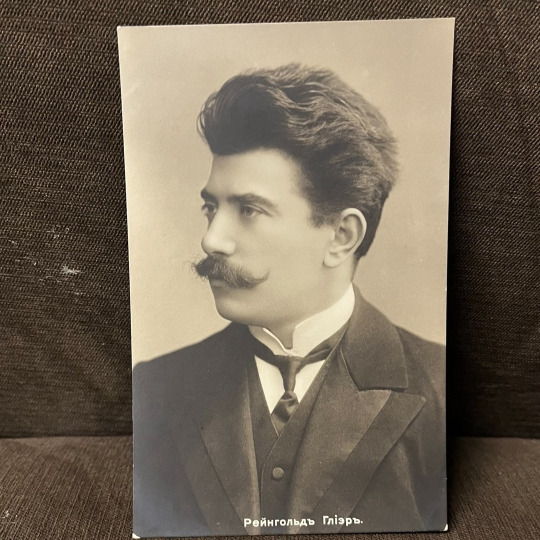
OTD in Music History: Soviet composer and pedagogue Reinhold Gliere (1875 - 1956) is born in what is now the Ukraine.
In 1894, the young Gliere entered the Moscow Conservatory, where he studied counterpoint with Sergei Taneyev (1856 - 1915), composition with Mikhail Ippolitov-Ivanov (1859 - 1935), and harmony with Anton Arensky (1861 - 1906).
When he graduated in 1900, Gliere was awarded a coveted gold medal in composition. The following year, he accepted a teaching post at the Moscow Gnesin School of Music, and the year after that his former professor Taneyev sent two very important private pupils his way: Nikolai Myaskovsky (1881 - 1950), and a startling eleven-year-old prodigy named Sergei Prokofiev (1891 - 1953).
In 1920, following the Russian Revolution, Gliere relocated to the Moscow Conservatory, where he taught intermittently until 1941. His students there included noted Armenian composer and conductor Aram Khachaturian (1903 - 1978).
During his own lifetime, Gliere enjoyed a very high status within the Soviet musical world -- largely because of his pronounced interest in exploring the ethnic folk music traditions that were native to various Soviet satellite states. He also directed committees of both the Moscow Union of Composers and Union of Soviet Composers, and was generally feted as something of a cultural celebrity within the USSR.
Today, however, only Gliere's so-called "Russian Sailors' Dance," an arrangement of the traditional folk song "Yablochko" ("Little Apple") that closes the first act of his ballet "Krasny mak" ("The Red Poppy," 1927), is still played with any frequency.
It seems clear that Gliere's lasting musical legacy lies in his substantial pedagogic impact, rather than his own creative output...
PICTURED: A c. 1910 real photo postcard showing the young Gliere sporting an impressive mustache.
#classical music#opera#music history#bel canto#composer#classical composer#aria#classical studies#maestro#chest voice#Reinhold Glière#classical musician#classical musicians#classical history#history of music#historian of music#musician#musicians#Ballet
1 note
·
View note
Video
youtube
Good morning (and for American followers, Happy Thanksgiving!) and welcome back to a week of Russian composers. While we have focused more on Russian nationalism and 19th century Orientalism, there were many composers at the time who went against the tide. So today I want to side-step to one of my favorite ‘unusual’ cases; Sergei Taneyev. While the other great Russians worked on orchestral music, he preferred chamber music. He also focused more on counterpoint and followed a “German” influence (similar to Tchaikovsky’s musical aesthetic, which earned him criticism from the contemporary Five). And at a time where Russian opera was mostly fairy tales with fantastic characters and situations, or detailed episodes in Russian history, Taneyev wrote an operatic version of The Oresteia, a trilogy of tragedies by Aeschylus; Agamemnon, The Libation Bearers, and The Eumenides. While writing the Oresteia overture, Taneyev felt that the music was too lengthy and gave away too many of the main dramatic moments, so he substituted it for a modest prelude, and flushed the overture out into a symphonic poem. The music is episodic, but it shows more of a Wagnerian influence with its rising and falling climaxes, full of intensity and drama.
Stay tuned for more Russian composers this week on musicainextenso
- Nick O., guest editor
#Taneyev#music#classical#opera#tone poem#symphonic poem#opera music#orchestra#orchestra music#romantic#romanticism#romantic music#russian music#classical music#Taneyev oresteia overture#Taneyev oresteia#Sergei Taneyev
16 notes
·
View notes